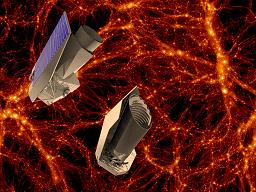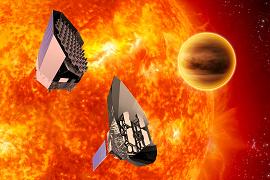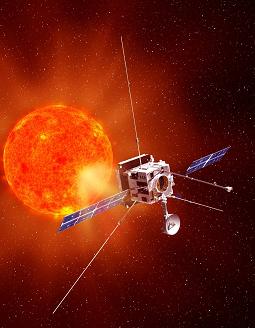UK Space Agency to explore the Universe with Cosmic Vision
The UK Space Agency has awarded £3.65M to help UK scientists prepare for three new space missions designed to unlock the secrets of the Sun; seek out distant planets that could harbour life; and
 |
| Artist's impression depicting Thales Alenia Space and EADS Astrium concepts for Euclid/Credit: ESA |
The missions – Euclid, PLATO and Solar Orbiter - are part of ESA’s Cosmic Vision programme (link opens in a new window) and have been selected from more than 50 original ideas to go forward for detailed technical and cost assessments. In June 2011, ESA will decide which two of the three missions to build and launch between 2017 and 2020. The UK Space Agency helps fund the European Space Agency’s highly successful series of space science missions – which include Mars Express and the Herschel space telescope - through its subscription to the ESA club.
Minister for Universities and Science David Willetts said: “We are committed to supporting Britain's thriving space industry, and this money will help to ensure that UK scientists working on these ambitious projects maintain our country's position as leaders in space science within Europe. These exciting missions will help unlock some of the greatest mysteries of our Universe, and have huge potential in furthering our knowledge of space science.”
Euclid
Euclid would address key questions relevant to fundamental physics and cosmology, namely the nature of the mysterious dark energy and dark matter. Current theory suggests that these substances dominate the ordinary matter of stars and planets. In particular, dark energy has been proposed to explain the observation made by the Hubble Space telescope that – contrary to expectations - the expansion of the Universe seems to be faster now than it was billions of years ago. Euclid would effectively look back in time about 10 billion years, covering the period over which dark energy seems to have accelerated the expansion of the Universe, and map the distribution of galaxies to reveal the underlying ‘dark’ architecture of the cosmos.
As currently planned, Euclid would use two different methods to build its map. One of the methods - weak gravitational lensing - maps the dark matter and measures dark energy by measuring the distortions of galaxy images. The other method involves studying baryonic acoustic oscillations - wiggle patterns, imprinted in the clustering of galaxies, which provide a standard against which to measure dark energy and expansion in the Universe.
 |
| Artist's impression depicting two spacecraft concepts/Credit: ESA |
PLATO
PLATO is designed to seek out planets far beyond our solar system, orbiting distant stars in our Galaxy, the Milky Way. It would be powerful enough to detect rocky planets in the habitable zone - the region around a star where liquid water can exist: in other words, to find new earths if they are out there. Using a suite of space telescopes on a single spacecraft, PLATO would detect these planets as they pass in front of their stars, blocking the star light and causing a brief and tiny dimming. The mission would focus on solar systems close enough to be scanned for bio-signatures, or signs of life by later missions and ground-based telescopes.
If selected for development, the UK, together with other ESA member states, will design PLATO’s scientific instruments and finance their development while ESA would commission the spacecraft to be
 |
| Artist's impression of Solar Orbiter/Credit: ESA |
Solar Orbiter
Solar Orbiter is designed to travel closer to our own star than any previous Sun-watching mission. It would use an elliptical orbit to take it up to the Sun’s higher latitudes to image, for the first time ever, the polar regions of our star. This special path would also allow Solar Orbiter to keep pace with the Sun’s rotation so that it could track specific features below it for several weeks at a time.
As it travels around the Sun, bombarded by the harsh solar wind, Solar Orbiter will carry out in-depth studies of the connections between the Sun and space and could provide major breakthroughs in our understanding of how the inner Solar System works and is driven by solar activity. The unique design of the spacecraft would allow it to withstand the scorching heat on the surface facing the Sun and the cold of space on the opposite surface which would always remain in shadow.
The UK is already playing a major role in the design of Solar Orbiter as EADS Astrium Limited - based in Stevenage, Hertfordshire - is leading the industrial study of the spacecraft under contract from ESA. Meanwhile, UK scientists (University College London, Imperial College London and STFC Rutherford Laboratory) are involved in four out of the ten possible instruments which the spacecraft would carry to study the Sun. Professor Chris Owen from UCL’s Mullard Space Science Laboratory is the Principal Investigator for the proposed Solar Wind Analyser while Dr Tim Horbury from Imperial College London is the Principal Investigator for the spacecraft’s proposed Magnetometer.
Source: UK Space Agency Website